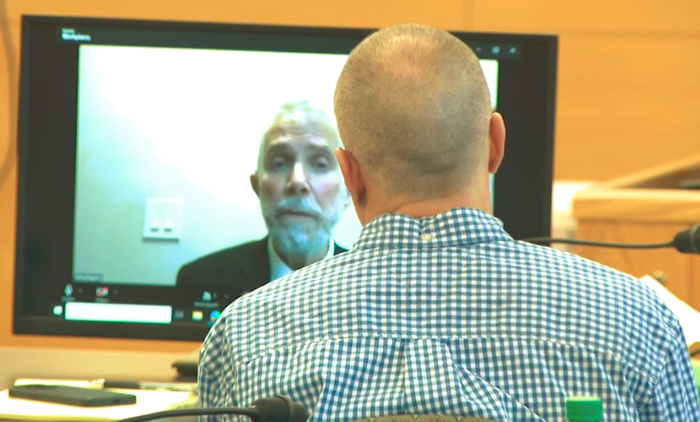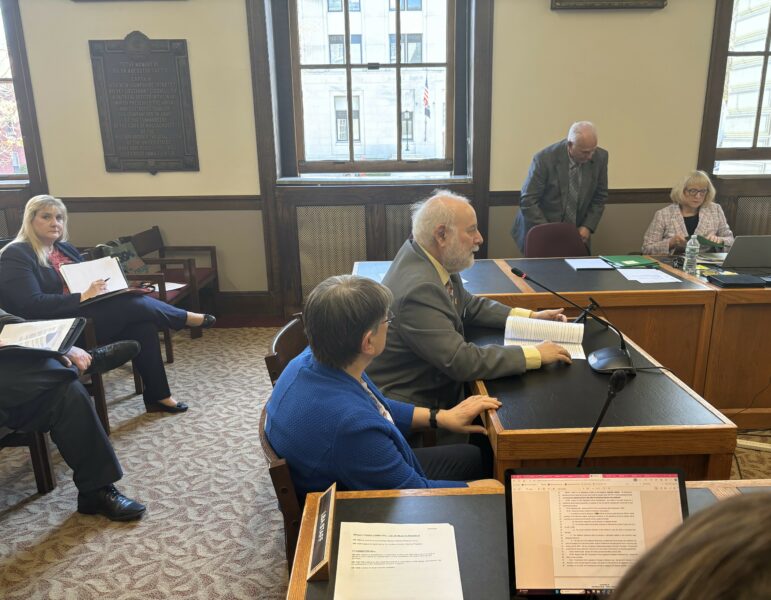By GARRY RAYNO, InDepthNH.org
“How much tinkering is too much?” is a good questions to ask after a bill’s policy is approved by the House and then goes through the House Finance Committee meat grinder.
Ostensibly, the House Finance Committee is to review and rework the finances of a bill not the public policy that has already been approved. But that has not been a deterrent to the committee changing and at times reversing policy the House approved.
House Bill 628 is a good example of “a little tinkering” altering the policy the House approved earlier.
Lawmakers several times have proposed a state family medical leave act to allow family members paid time off to attend to a family member who is ill or dying, but have been unsuccessful.

Garry Rayno
But after studying the issue and an organized outreach initiative, supporters were hopeful heading into this session.
HB 628 was first sent to the Labor, Industrial and Rehabilitative Services Committee which made some changes and recommended it pass, which it did.
The bill was sent to the Commerce and Consumer Affairs Committee to determine how it might affect businesses.
The committee recommended the bill be killed, but the majority of House members did not agree, voting to keep it alive, proposing changes and finally approving it on an 186-164 vote.
HB 628 was sent to Finance for review.
Finance’s division one subcommittee proposed major changes to the bill and presented the new version to the full 26-member committee Wednesday. A vote down party lines produced a 15-11 vote Republican victory.
Now during the final week before cross over, the House will decide once more on family medical leave.
The changes replace what was a state-run program offering six weeks of family medical leave with a private insurance, short-term disability leave program of no more than four weeks and no more than 67 percent of state-average wages.

Rep. Mary Gile
The bill’s prime sponsor, Rep. Mary Gile, D-Concord, said the latest version is a totally different model than what she proposed.
In both cases employees’ wages would be garnished to pay for the program that all employers would have to join unless they are self-insured with similar benefits or the state, which lawmakers exempted from the program.
The bill has been controversial with opponents claiming it institutes an income tax and supporters saying its is sorely needed given the state’s aging population.
Writing for the majority of the Finance Committee, Rep. J. Tracy Emerick, R-Hampton, and the vice chair of division one, said the original bill would have “required the state to develop a costly, custom computer system to track the program and to hire a minimum of 43 new employees with an expected expenditure of nearly $50 million in the first biennium with a launch date at least three years in the future.”

Rep. J. Tracy Emerick
The new version is based on a plan from another state using private insurers, he said.
“The plan offers a free market option good for business and allows employees to opt in and out on a yearly basis,” Emerick said. “The bill as previously passed required an employee to change jobs in order to opt out of the plan.”
But Rep. Patricia Lovejoy, D-Stratham, said the model for the Republican’s plan is New York, which requires approximately 20 million workers to be covered by family medical leave insurance.The new plan lets employees opt out every year which makes it unlikely any private insurance companies would offer policies here.

Rep. Patricia Lovejoy
“(The new version) changes the House established policy from a public family and medical insurance program into a mandate on employers to offer the benefit themselves through private insurance companies,” Lovejoy said. “Two policy committees have worked on this program; it is not the Finance Committee’s role to totally reengineer the policy but to focus on the financial issues associated with the bill.”
And she noted there has been no public hearing on the GOP’s plan.
What had been a bipartisan undertaking has turned into a partisan battle. The newest version certainly reflects more of Republican philosophy, smaller government, private companies and limited benefits over what the House had previously approved.
You can never be sure whether the new plan was developed by the subcommittee or if they are doing what they are told from the House Speaker’s or the governor’s office.
Realistically if the House approves the new plan, there is little reason for the Senate to wade in, and even if they do, and the bill is approved, there is little likelihood any insurer would want to participate under the terms of the legislation.
More likely the wholesale changes are an attempt to kill the bill and at the same time blame Democrats for abandoning it although the policy is the antithesis of what a bipartisan coalition approved a month ago.
Things like this often happen near the cross over and final deadlines for legislation. Defeat is grabbed from the jaws of an unexpected victory.
Road User Fees
For many years, the state highway fund, which pays for the maintenance and construction of roads and bridges, has seen declining revenues.
Cars have become more fuel efficient and at the same time electric and hybrid vehicles have become more popular.
Two revenue streams feed into the highway fund that funds highway maintenance and construction – vehicle registrations and the gas tax.
The trend for vehicle registrations is upward, but gas tax revenue continues to trend down even with a gas tax increase several years ago because fewer gallons of gas are pumped each year.
Consequently, Department of Transportation officials and key lawmakers have tried to create an equitable way for hybrid owners to pay their fair share of highway costs.

Rep. Norm Major
However, attempts to close the gap with road usage fees were salvaged when they were proposed, including one by Rep. Norm Major, R-Plaistow, who created a model based on average miles traveled and miles per gallon several years ago.
This week, the House will vote on his latest attempt to help offset the lost revenue from electric and hybrid vehicles.
House Bill 1763 would assess a road usage fee when a vehicle is registered each each year depending on milage. The fee would range from less than $30 to slightly more than $110. The fee would raise about $21 million annually.
The bill was recommended on a 23-0 vote of the House Ways and Means Committee Major chairs, and initially passed the House on a 194-132 vote and was sent to House Finance where a few minor changes were made. The committee voted 21-5 to recommend the bill pass.
Like family medical leave, some things have to percolate for a few sessions for lawmakers to be convinced of their value.
So this week, the House will probably approve the bill and send it to the Senate where its future is uncertain.
And we start all over again.
Garry Rayno may be reached at garry.rayno@yahoo.com





